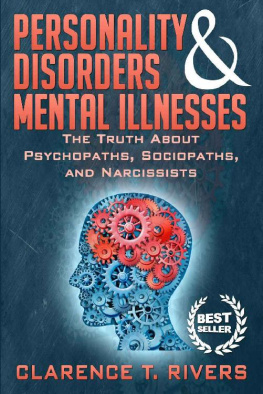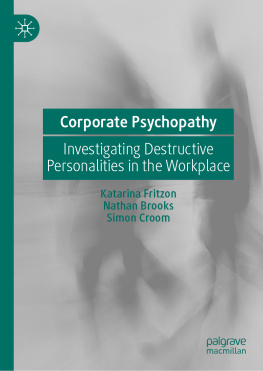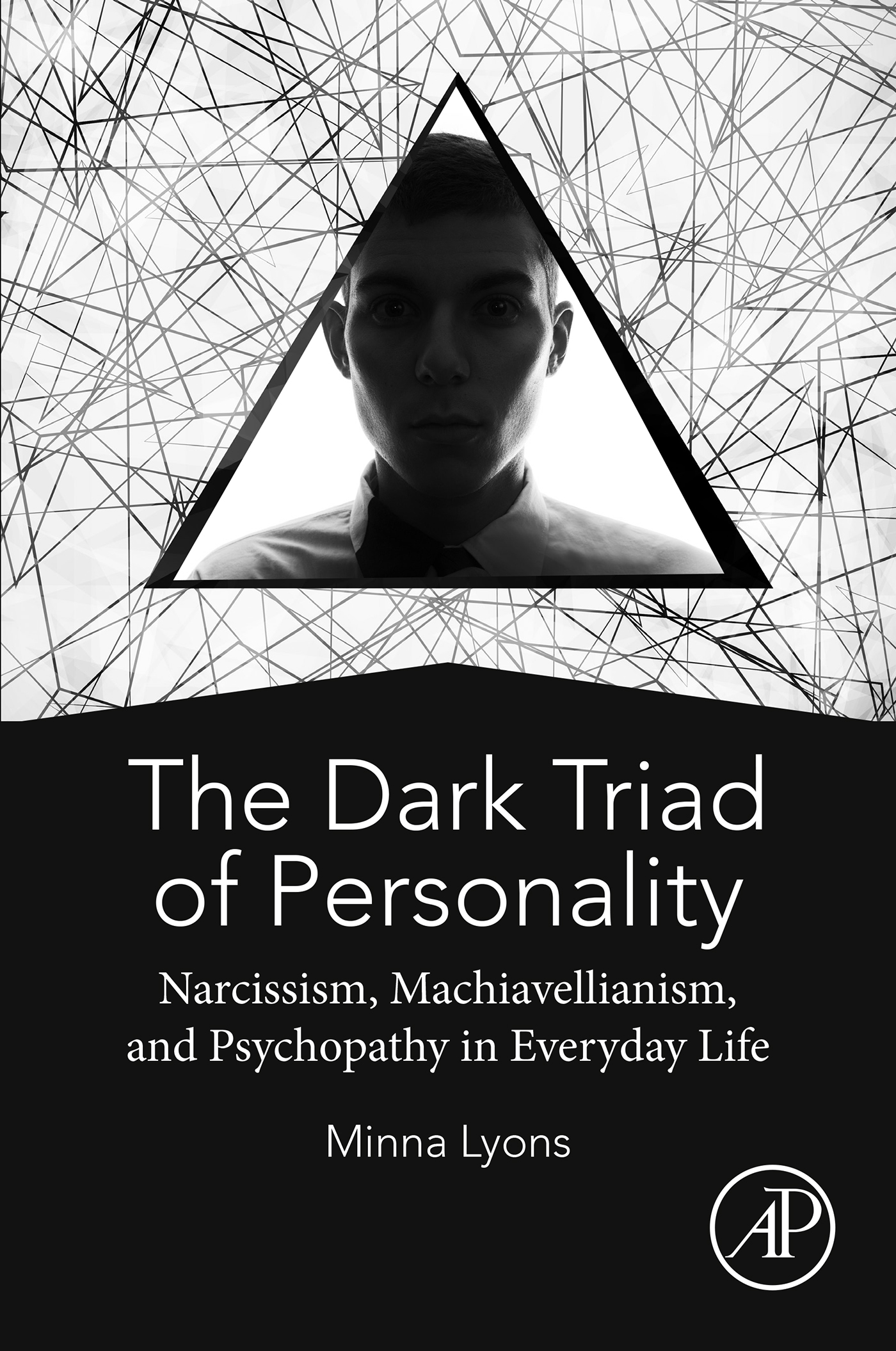The Dark Triad of Personality
Narcissism, Machiavellianism, and Psychopathy in Everyday Life
First Edition
Minna Lyons

Copyright
Academic Press is an imprint of Elsevier
125 London Wall, London EC2Y 5AS, United Kingdom
525 B Street, Suite 1650, San Diego, CA 92101, United States
50 Hampshire Street, 5th Floor, Cambridge, MA 02139, United States
The Boulevard, Langford Lane, Kidlington, Oxford OX5 1GB, United Kingdom
2019 Elsevier Inc. All rights reserved.
No part of this publication may be reproduced or transmitted in any form or by any means, electronic or mechanical, including photocopying, recording, or any information storage and retrieval system, without permission in writing from the publisher. Details on how to seek permission, further information about the Publishers permissions policies and our arrangements with organizations such as the Copyright Clearance Center and the Copyright Licensing Agency, can be found at our website: www.elsevier.com/permissions.
This book and the individual contributions contained in it are protected under copyright by the Publisher (other than as may be noted herein).
Notices
Knowledge and best practice in this field are constantly changing. As new research and experience broaden our understanding, changes in research methods, professional practices, or medical treatment may become necessary.
Practitioners and researchers must always rely on their own experience and knowledge in evaluating and using any information, methods, compounds, or experiments described herein. In using such information or methods they should be mindful of their own safety and the safety of others, including parties for whom they have a professional responsibility.
To the fullest extent of the law, neither the Publisher nor the authors, contributors, or editors, assume any liability for any injury and/or damage to persons or property as a matter of products liability, negligence or otherwise, or from any use or operation of any methods, products, instructions, or ideas contained in the material herein.
Library of Congress Cataloging-in-Publication Data
A catalog record for this book is available from the Library of Congress
British Library Cataloguing-in-Publication Data
A catalogue record for this book is available from the British Library
ISBN 978-0-12-814291-2
For information on all Academic Press publications visit our website at https://www.elsevier.com/books-and-journals

Publisher: Nikki Levy
Acquisition Editor: Nikki Levy
Editorial Project Manager: Megan Ashdown
Production Project Manager: Bharatwaj Varatharajan
Cover Designer: Christian J. Bilbow
Typeset by SPi Global, India
Chapter One
Introduction to the Dark Triad
Abstract
The first chapter sets the scene for the rest of the book, introducing the Dark Triad in the light of clinical, forensic, and personality literature. I will discuss briefly the historical background of the Dark Triad as a personality constellation and evaluate the traits in the nomological network with other personality traits. I will demonstrate how the traits relate to outcomes such as empathy, risk-taking, and impulsivity. This chapter is also going to include discussion of the Dark Triad from etiological point of view, looking into evolutionary theories, genetics, and environmental factors. The chapter contains a brief overview of sex differences, as well as an evaluation of different questionnaire measures for the Dark Triad. I will also discuss the concept of the Dark Tetrad (i.e., Dark Triad and sadism). Finally, the shortcomings in the current research will be highlighted.
Keywords
The Dark Triad; The Dark Tetrad; The Big Five; HEXACO; Empathy; Etiology; Risk-taking; Deviant behavior; Sex differences; Measurements
Chapter Outline
- 1.1
- 1.2
- 1.3
- 1.4
- 1.5
- 1.6
- 1.7
- 1.8
1.1 The Dark Triad: What Is It?
Jack/Jodie is a player. S/he likes to gamble with money, and juggle multiple romantic relationships at the same time with several wo/men. S/he has a cynical view of the world, and other people in it. Jack/Jodie feels that it is best to take advantage of others before they try to take advantage of you. Jack/Jodie thinks that s/he is great at everything that s/he does, and deserves best things in life. S/he has very little empathy for others, and treats people as tools for achieving his goals. Jack/Jodie is easily insulted, and longs for revenge when things dont go his/her way.
Jack and Jodie are fictional characters, but they could easily exist in real life. Characters like them have qualities that typify features of malignant personality traits, also known as the Dark Triad of personality. In the past few decades, the socially aversive Dark Triad of personality has captured the attention of both researchers and the general public alike. Since the conception of the construct by Paulhus and Williams in 2002, it has been studied intensively in thousands of academic publications. Without a doubt, we have a fascination for people who are antagonistic, selfish, and exploitative, to the extent that these people are often portrayed with admiration in the popular culture (). This book is the first attempt to bring together the wealth of research on the topic, evaluating the significance of the Dark Triad in everyday life ranging from romantic relationship to workplace behavior.
The Dark Triad consists of three overlapping, yet distinctive personality traits: Machiavellianism, narcissism, and psychopathy. The traits share a core of manipulation, callousness, and selfishness ().
As well as the toxic core, the three traits have some unique characteristics. Machiavellianism is distinctive in the flexible, chameleon-like use of strategies from defection to cooperation to suit the demands of the situation, with the ultimate aim of gaining benefits for the self. Interestingly, a study on a sample of Polish participants found that out of the three traits, Machiavellianism was a significant positive predictor of fluid intelligence (. Unfortunately, the influence of the Dark Triad within families is less studied, especially in terms of the impact of having a parent with a toxic personality. Therefore parenting and families are only briefly considered later in this chapter, as part of the discussion of the origins (i.e., etiology) of the Dark Triad.
In the personality disorder literature, especially psychopathy and narcissism are often researched in clinical samples. Participants in these studies are individuals who are under the supervision of clinical or forensic facilities, and have received a personality disorder diagnosis. In contrast, research on subclinical or nonclinical populations consists of people in the community, often using students or diverse internet samples. In these samples, the Dark Triad is investigated as a continuum, without making a distinction between normal and abnormal. In , forensic implications will be discussed.








